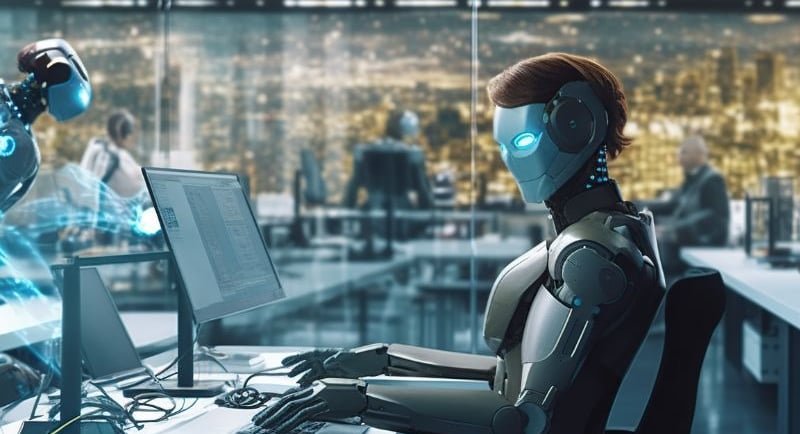Do You Know How Artificial Intelligence Is Affecting Jobs Worldwide
#DoYouKnow, #ArtificialIntelligence, #AIJobs, #FutureOfWork, #Automation, #TechRevolution, #JobMarket, #AIImpact, #Reskilling, #Upskilling, #DigitalTransformation, #SmartTechnology, #JobDisplacement, #WorkplaceTrends, #MachineLearning
TECH & SCIENCE
7/26/20252 min read


Artificial Intelligence (AI) is transforming the way we live, work, and think. From chatbots and automation tools to advanced data analysis and robotics, AI is rapidly integrating into every corner of our global economy. But with this transformation comes a pressing question: How is AI impacting jobs around the world? The answer is complex and layered—bringing both opportunities and challenges.
1. What Is Artificial Intelligence?
Before diving into its impact, it's essential to understand what AI actually is. Artificial Intelligence refers to computer systems capable of performing tasks that typically require human intelligence, such as:
Learning
Reasoning
Problem-solving
Language understanding
Vision processing
AI technologies range from simple algorithms to advanced neural networks and machine learning systems.
2. Automation of Repetitive Jobs
One of the most significant ways AI is affecting employment is through automation. Tasks that are repetitive and rule-based—such as data entry, customer service chats, manufacturing line work, and logistics management—are increasingly being handled by machines.
Industries most affected include:
Manufacturing – Robotic arms and automated assembly lines.
Retail – Self-checkout systems and inventory management.
Transport – Self-driving vehicles and route optimization tools.
Result: While efficiency has improved, millions of low-skill jobs are being reduced or eliminated.
3. New Job Creation in Tech and AI Fields
While AI is displacing certain jobs, it is also creating new ones—many of which didn’t exist a decade ago. Examples include:
AI developers
Machine learning engineers
Data scientists
AI ethics experts
Robotics technicians
Cloud computing specialists
These jobs require new skills, pushing education systems and workers to adapt rapidly.
4. Changing Roles in Traditional Fields
AI is not just replacing jobs—it’s reshaping them. In healthcare, for example, AI assists doctors in diagnosing diseases using imaging data. In law, AI tools help scan thousands of legal documents in seconds.
Thus, the nature of work is shifting. Employees are increasingly required to work alongside AI—enhancing their productivity and decision-making.
5. The Rise of the Gig and Remote Economy
AI-powered platforms are helping expand remote and gig work. Ride-sharing, freelance marketplaces, and digital content platforms are run by AI algorithms that connect people to tasks, clients, or services instantly.
While this offers flexibility, it also means less job security and fewer benefits, prompting calls for stronger digital labor rights.
6. Uneven Impact Across Countries
AI’s effect on employment varies globally:
Developed countries are investing heavily in AI research and re-skilling their workforce.
Developing countries, however, risk losing outsourcing opportunities and manual labor roles.
The digital divide could widen if developing economies do not receive support in AI education and infrastructure.
7. Reskilling: The Urgent Need
As AI transforms industries, reskilling and upskilling have become more crucial than ever. Governments, companies, and educational institutions are being urged to:
Introduce AI and tech literacy from an early age
Provide continuous learning opportunities
Offer subsidized online courses
Without this shift, millions risk being left behind.
8. Ethical Considerations and Job Rights
As AI grows, so does concern over:
Bias in algorithms
Job displacement without social safety nets
Surveillance at workplaces
Loss of human touch in service sectors
Global organizations like the UN and World Economic Forum advocate for AI governance policies that protect worker rights and promote ethical development.
Conclusion
Artificial Intelligence is a double-edged sword. It has the power to elevate global productivity, create innovative job roles, and improve living standards. But without inclusive policies and proactive upskilling, it can also deepen inequality and lead to widespread job loss. The future of jobs in an AI-powered world depends not on the technology itself, but on how we choose to adapt to it.
Knowledge
Empowering minds with reliable educational content daily.
Newsletter Signup
© 2025 DoYouKnow. All rights reserved.
Stay Ahead of the Trends – Join Our Newsletter
